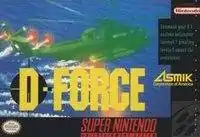D-Force
D-Force[lower-alpha 1] is a 1991 vertical scrolling shooter video game developed and published in Japan by Asmik for the Super Famicom and later localized and published in North America by Asmik Corporation of America for the Super NES. It involves an Apache helicopter set on defeating an evil Middle Eastern dictator. There are seven levels which feature six countries. Some of the levels involve switching altitudes in order to attack enemies from a different height, which uses Mode 7, one of the main features of the Super NES.
| D-Force | |
|---|---|
 North American cover art | |
| Developer(s) | Cream[1] |
| Publisher(s) | Asmik |
| Platform(s) | Super NES |
| Release | |
| Genre(s) | Vertically scrolling shooter |
| Mode(s) | Single-player |
Gameplay
The main menu splits the game up into three sections; "Game Start," "Shooting Mode," and "Exploration Mode."
Game Start plays through all of the game's seven levels. Shooting Mode plays only the first, third, and fifth levels where consistent shooting and dodging enemy fire is the main focus. These levels are also the only levels that feature the ability to gain bullet and missile power-ups to the helicopter. "Exploration Mode" plays only the second, fourth, and sixth levels which involve switching altitudes to shoot down certain enemies and avoid obstacles. Only the Game Start mode plays the seventh and final level in addition to the game's first six levels.
Gameplay involves being the pilot of an Apache Helicopter, and shooting enemies down in the style of a vertical scrolling shooter. Large red gunships can be shot down to gain power-ups for the helicopter in order to upgrade the guns and have it fire homing missiles. Each level features a midboss and a boss, and both must be destroyed in order to advance to the next level. The style of the levels as the player advances alternates between "Shooting Mode" and "Exploration Mode," where the latter involves levels set in a fantasy-like setting and are the only level types that provide no power-ups to the player and give the player the ability to switch their altitude.
Music
The music played at the menu is a variation of the French national anthem, La Marseillaise. The music played at the ending credits is a variation of the Soviet Union National Anthem.
Reception
| Publication | Score |
|---|---|
| Aktueller Software Markt | 1/12[4] |
| Consoles + | 35%[5] |
| Famitsu | 18/40[2] |
| Games-X | |
| Génération 4 | 61%[7] |
| Joystick | 45%[8] |
| Nintendo Power | 3.1/5[9] |
D-Force garnered average reviews from critics, most of which reviewed it as an import title.[4][5][6][7][8] Game Players's Matthew A. Firme opined that the game's visuals were an improvement over the Nintendo Entertainment System, writing that "What it may lack in graphics, D-Force certainly makes up for in enthusiam".[10] Famitsu's four reviewers found the ability to switch between low and high altitudes in technical mode surprising, but noted how difficult was powering-up the helicopter and fast movement of enemy bullets. They also saw both the helicopter's movement and spawning of enemies confusing and unnatural respectively.[2] François Hermellin of Consoles + commended the reponsive controls of the helicopter, but faulted the game's presentation, "ugly" graphics, unremarkable sprite animations, soundtrack, and minimal replay value.[5]
Games-X magazine criticized D-Force for its graphical presentation, particularly the "bland" sprites and poor rotation effects, as well as the monotonous sound effects, and below average gameplay. They stated that "This is anything but the best shoot’em-up on the [Super] Famicom and you'd be better off avoiding it and trying your hand at Gradius 3 instead, a truly class game."[6] Nintendo Power's George Sinfield and Rob Noel liked the background visuals but they felt that it did not offered any innovation compared to other vertical-scrolling shooters on NES. Sinfield also expressed that it played like "a bunch of games made for NES."[9] Génération 4's Frank Ladoire noted that it suffered slowdown when several sprites are present onscreen, as with other shooters on SNES such as Super R-Type and Earth Defense Force (1991). Ladoire also felt the game did not benefit from its audiovisual presentation.[7]
Joystick's Jean-Marc Demoly concurred with Games-X magazine, faulting the game's visuals and animations. Although Demoly commended its controls and boss encounters, he ultimately found it to be poorly done.[8] Aktueller Software Markt's Lars Rückert found the game annoying, lambasting its jerky screen scrolling.[4] In a retrospective outlook, Retronauts writer Jeremy Parish stated that D-Force "might be the worst and most generic shooter ever released for Super NES."[11]
References
- CRV (January 11, 2009). "Cream". Game Developer Research Institute. Archived from the original on 2023-03-14. Retrieved 2023-05-06.
- "NEW GAMES CROSS REVIEW: ディメンションフォース". Famitsu (in Japanese). No. 158. ASCII Corporation. December 27, 1991. p. 40.
- "Super NES Games" (PDF). Nintendo. Archived (PDF) from the original on 2008-09-20. Retrieved 2023-05-06.
- Rückert, Lars (April 1992). "Konsolen: Abgeschmiert — D-Force (Super Famicom)". Aktueller Software Markt (in German). No. 62. Tronic Verlag. p. 120.
- Hermellin, François (December 1991). "Super Famicom Review: Dimension Force". Consoles + (in French). No. 4. M.E.R.7. pp. 48–49.
- "Console Connexions: Dimension Force (Famicom)". Games-X. No. 38. Europress. January 16–22, 1992. p. 25.
- Ladoire, Frank (February 1992). "Console Test: Dimension Force (Super Famicom)". Génération 4 (in French). No. 41. Computec. p. 150.
- Demoly, Jean-Marc (February 1992). "Console News: Dimension Force (Super Famicom)". Joystick (in French). No. 24. Sipress.
- Sinfield, George; Noel, Rob (January 1992). "Now Playing - D-Force". Nintendo Power. No. 32. Nintendo of America. pp. 102–103.
- Firme, Matthew A. (August 1991). "Super NES: 3 More Games To Play! — D-Force". Game Players. Vol. 4, no. 8. Signal Research. pp. 34–35.
- Parish, Jeremy (March 17, 2023). D-Force: Force manure. pp. 1–256. ISBN 978-1955183062. Retrieved 2023-05-04.
{{cite book}}:|work=ignored (help)